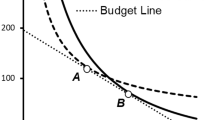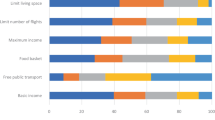Abstract.
Several “Paretian” welfare rules are equivalent when policymakers know agents' characteristics, e.g., a policy is optimal if (a) any other policy making someone better off harms some agent, or (b) it is the maximum of some social welfare function. This paper extends these and other rules to environments where policymakers have a probability distribution over a state space of possible models. Under weak conditions, rule (a), which postulates ex ante preferences for agents, recommends some change from almost every status quo policy. Unfortunately, (a) requires a demanding form of interpersonal welfare comparability. Rule (b) labels all policies optimal if the state space obeys a weak diversity condition. Since the probabilities of states are irrelevant for this result, only a small perturbation of a model with no uncertainty generates policy paralysis.
Similar content being viewed by others
Author information
Authors and Affiliations
Additional information
Received: 26 March 1997/Accepted: 16 November 1998
Rights and permissions
About this article
Cite this article
Mandler, M. Interpersonal comparisons of utility and the policy paralysis problem. Soc Choice Welfare 17, 95–115 (2000). https://doi.org/10.1007/PL00007178
Issue Date:
DOI: https://doi.org/10.1007/PL00007178




